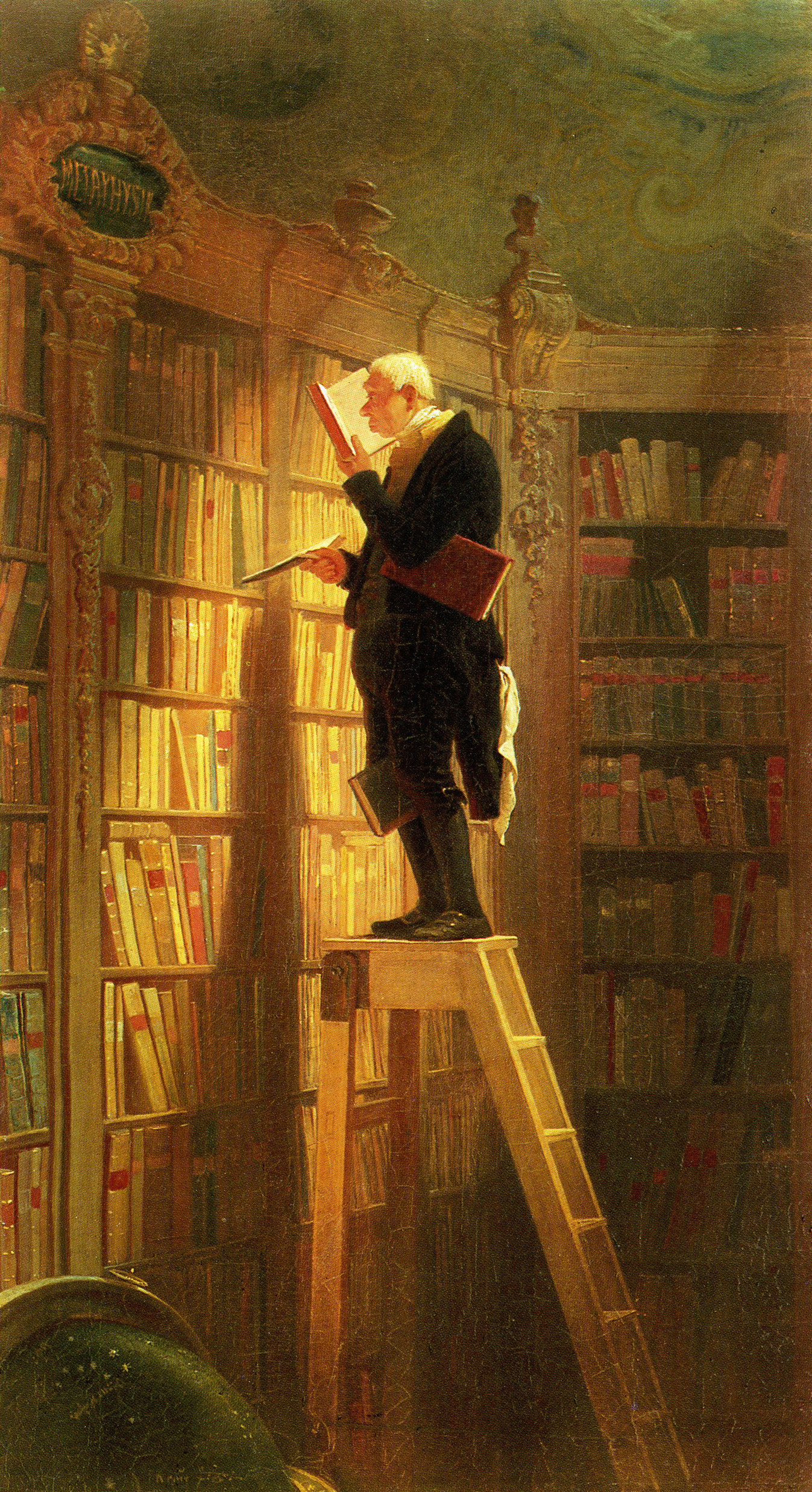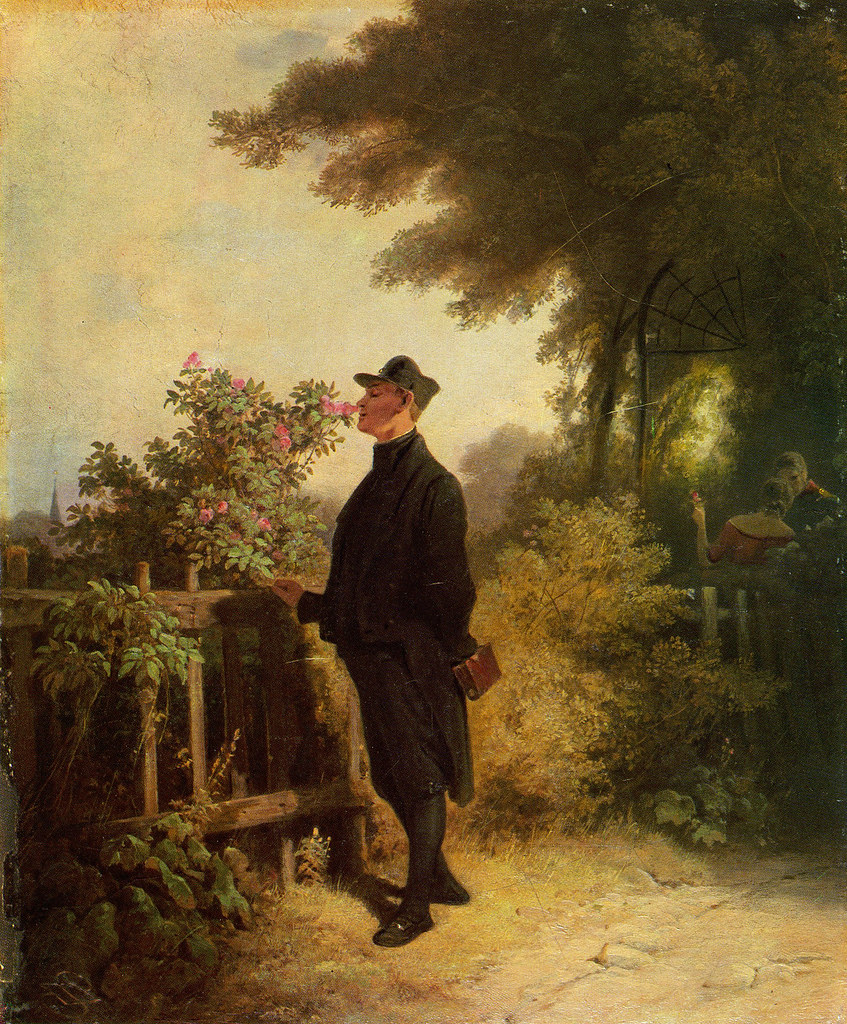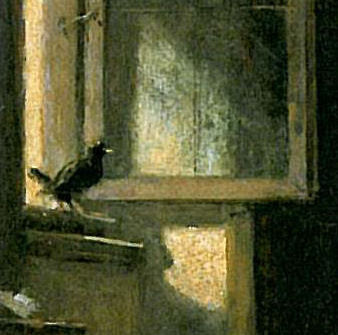.
![[Reading+the+Breviary,+The+Evening.jpg]](https://blogger.googleusercontent.com/img/b/R29vZ2xl/AVvXsEjFajhhZB6E8D_v9vs6plV5xvLbYWV7WaK_mFHUfWxOt-LgpdCYYIOm7YzTYAoik7dTamaLZuC3nKgvtN_Vg0fMLq4oX1u-AKu1KZzgHEsMla4JKexTAmAJcWvae24_aIHQOqv6IqCzc6DT/s1600/Reading+the+Breviary,%2BThe%2BEvening.jpg)
Reading the Breviary, Evening: Carl Spitzweg (1808-1885), 1839, oil on canvas (Musée du Louvre, Paris)
Dear Margie, hello It is 5.15 a.m.
dear Berrigan He died
Back to books.
Ted Berrigan, Sonnet II (excerpt), from The Sonnets, 1964
O bliss of the collector, bliss of the man of leisure! Of no one has less been expected, and no one has had a greater sense of well-being than the man who has been able to carry on his disreputable existence in the mask of Spitzweg's "Bookworm." For inside him there are spirits, or at least little genii, which have seen to it that for a collector -- and I mean a real collector, a collector as he ought to be -- ownership is the most intimate relationship that one can have to objects. Not that they come alive in him; it is he who lives in them. So I have erected one of his dwellings, with books as the building stones, before you, and now he is going to disappear inside, as is only fitting.
Even the dream of a "better humanity" in which our children would "have a better life" is only a sentimental fantasy reminiscent of Spitzweg when it is not, at bottom, a dream of a better nature in which they would live.

The Bookworm (Der Bücherwurm): Carl Spitzweg, c. 1850, oil on canvas; image by Tagada Victoria, 10 October 2008 (Sammlung Georg Schäfer, Schweinfurt)
The Poor Poet (der Arme Poet): Carl Spitzweg, 1839, oil on canvas, 36.2 x 44.6 cm; image by Cybershot 800i, 20 June 2011 (Neue Pinakothek, Munich)

Perfume of a Rose, Memory (Rosenduft, Erinnerung): Carl Spitzweg, oil on canvas, 1849

The Professor (Zeitungsleser im Hausgarten): Carl Spitzweg, c. 1860, oil on panel, 21.3 x 15.5 cm (Museum Pfalzgalerie Kaiserslautern)

Art and Knowledge (Kunst und Wissenschaft): Carl Spitzweg, 1880, oil on canvas

The Forbidden Path (Der verbotene Weg): Carl Spitzweg, c. 1840, oil on canvas, 38.3 x 31.2 cm; image by LeastCommonAncestor, 17 November 2010 (Sammlung Georg Schäfer, Schweinfurt)

The Bachelor (Der Hagestolz): Carl Spitzweg, n.d., oil on panel, 38.2 x 46 cm (Museum der Bildenden Künste, Leipzig)

The Cactus Lover: Carl Spitzweg, c. 1850, oil on canvas (Sammlung Georg Schäfer, Schweinfurt)

A Visit: Carl Spitzweg, c. 1850, oil on cardboard, 22.1 x 26.7 cm (Sammlung Georg Schäfer, Schweinfurt)

A Visit (Ein Besuch) (detail): Carl Spitzweg, c. 1850; image by Immanuel Giel, 3 September 2007 (Sammlung Georg Schäfer, Schweinfurt)

A Visit (Ein Besuch) (detail): Carl Spitzweg, c. 1850; image by Immanuel Giel, 3 September 2007 (Sammlung Georg Schäfer, Schweinfurt)

The Raven: Carl Spitzweg, c. 1840, oil on canvas (Baxerische Staatsgemäldesammlung, Munich)

The Raven (detail): Carl Spitzweg, c. 1840 (Baxerische Staatsgemäldesammlung, Munich)
11 comments:
This is beautifully realized and wonderful to be able to pull up, consult and be consoled by. I've always loved that Ted Berrigan fragment/image and the raven image and detail are memorable and affecting. Curtis
Thank you, Curtis.
The book as such now seems such an outmoded object -- I doubt very much that Carl Spitzweg, Walter Benjamin or even Ted Berrigan could have foreseen its fate.
George Packer: Cheap Words --- Is Amazon bad for books?
"...book sales in the U.S. now make up no more than seven per cent of the company’s roughly seventy-five billion dollars in annual revenue."
The Amazon information is upsetting, but not really surprising. Because of Jane, I get to observe the "younger set" fairly frequently and I don't see books figuring into their lives nearly as much as they figured into mine. When I visit our local Barnes & Noble, a pretty nice store, the non-book sections are a lot livelier than the book sections. The local public libraries I visit in PA and NY are mostly overrun by computer users there for free internet and I noticed last week that the NY Public Library branch I used to haunt, the Donnell across from MOMA, has been replaced by the Baccarat Residences. A couple of years ago, a friend from Tuxedo Park who's a pretty well-known editor at one of the major publishing houses told me he couldn't believe the news story I cited about e-books having overtaken traditional hardcover and softbound publishing, but the story was from a reliable source and correct. So I guess the world doesn't make much sense to me at the moment, which finds me on the Keystone from NY-Penn Station to Paoli, PA, reading a book by an author I was introduced to on Beyond The Pale. Curtis
I read as much of the New Yorker article as I could handle. It was pretty good, but SO depressing. I can't really agree that Amazon is "bad for books," but perhaps I'm not being thoughtful enough. There are so many facets of the situation to consider. We have an excellent local "old" books store in Bryn Mawr where I spend a lot of time because it's near my daughter's school. It's a superb place and it feels like such an archeological relic. I mostly buy the books I acquire there and on Abe.com. I would like to think that my daughter would value and in fact treasure our books in the same way Caroline and I treasured our parents' libraries, but it's really difficult to imagine. The nice thing is that she's very creative herself and always busy designing and devising new and original things. Curtis
Beautiful, haunting post! More to consider about the future of the book. A friend recently made a cogent argument as to the validity of e-books as their own, stand-alone, publications — quality of graphics, ability to include audio and video. Still, there's nothing like holding something in your hand and "paging" through it. But the times they may be a-changin'. Look to the young.
Well, searching for something kind to say about them, at least our friends down there in the Amazon are working overtime to make sure that the stuff we order -- the cheap books, the t-shirts and mugs, the prefab storage-locker-size cube-motel rental units and so on -- all that good stuff -- reaches us right on time.
"But seriously" (ok, so ridiculous is the new serious.... just saying), one has lovely memories of books. And more and more with every passing well-organized day, it grows apparent books are but a lovely memory. One recalls the touching scene in the film Fahrenheit 451, in which, once all the books have been torched, a small colony of fugitive literate survivors, those few people who have dedicated themselves to committing a single book to memory, in order to save it for mankind, have gathered in the woods, where they wander about, mumbling the reiterated memorized classic words -- to themselves.
Which reminds us that the nostalgic devotion to books contains a strong element of what now must be (let's face it) seen as fetishism.
The historical bibliophiliac specimens assembled here, for example, come from 1) a great comic appropriator and plunderer of books; 2) a dedicated collector of books, who regarded great collectors with a kind of respect awarded priests in certain cultures; and 3) a popular, very successful and entirely self-trained nineteenth century creator of amusing sentimental kitsch images enjoyed by the very classes he was gently poking fun at, even as they ponied up.
(It's no accident the best-known example of Spitzweg's influence is the work of Norman Rockwell -- again, cargo from a lost cultural epoch, unknown, for better or worse, to today's young.)
The three are artists whose work, reputations and legend remain intimately associated with books, even though their actual relation to books, when considered at all carefully, might have been what might now be thought of as, well... a bit odd.
I don't think books have an optimistic future as tiny display packages on portable handheld electronic devices, and I don't think there will be much of a future for real books in any case, as they certainly require far more hours of selfless attention than anyone currently living on this earth has left. The one person I know who deeply appreciates, enjoys and respects books and spends many hours every day reading them, maintains this practice by hiking some distance to one of the few remaining public library branches, to supply her habit. It's perhaps a bit strange, but it's also wonderful to behold. So for her sake, here's to the memory of the wondrous pleasures of books!
(For my own part, physical disorders -- eye, hands -- have made books increasingly unmanageable any more, so that my own thoughts on this subject are perforce not so much acts of the intellect as, again, fond effusions of memory, performed by that strange grey ball of noodleroni located between the still partially intact unnecessarily-large ears.)
Thinking back to that original film version of the Bradbury tale, with its nostalgic evocation of reading as an act of love and memorization, I recall, once, in another century, finding myself in one of those "panel" settings, before an audience of 500 high school English teachers from San Mateo, with the theme: Can poetry to be taught to high school students? Or perhaps it was not "can" but "should".
In any case, the panelists had distinctive views. Bruno Bettelheim had his. John Felstiner, a Stanford academic, shared Adorno's judgment that lyric poetry was dead after Auschwitz. (The same Adorno who had also proclaimed jazz a "low" cultural form, better suited to monkeys.) And then -- Robert Penn Warren, who didn't show up but had sent along a note -- handwrit, yet -- which was read aloud. And in that note he got right down to the point. Neither students nor teachers were qualified to read poetry any more, RPW opined in his note, because the only way to learn or teach poetry was through memorization -- and neither students nor teachers any longer had the patience or mental discipline for that. "Too lazy," he sniffed inarguably, in his lovely, crisp, show-stopping note.
The high school teachers gaped, unknowing, when it was read aloud to them by the embarrassed moderator.
Still, that was then -- as I say, already a long, long time ago, well before Amazon was yet a gleam in the eye of Godzilla.
"Is it true that a long time ago people used to WRITE books, not just generate algorithms, accumulate followers and collect 'likes'?'"
But to be be fair to Amazon, as they're always so fair to themselves, it must be admitted that without their tireless service, readers of the world might well be deprived of such "premiere" titles as this.
(That one's really been moving the units, as we say in the biz.)
Customers who viewed this item also viewed an item called "Moby Dick".
Moby... a rock star, right?
The appendages of rock stars can really move those units!
Thanks for sharing, nice post! Post really provice useful information!
Giaonhan247 chuyên dịch vụ vận chuyển hàng đi mỹ cũng như dịch vụ ship hàng mỹ từ dịch vụ nhận mua hộ hàng mỹ từ trang ebay vn cùng với dịch vụ mua hàng amazon về VN uy tín, giá rẻ.
Loved reading this thannks
Post a Comment